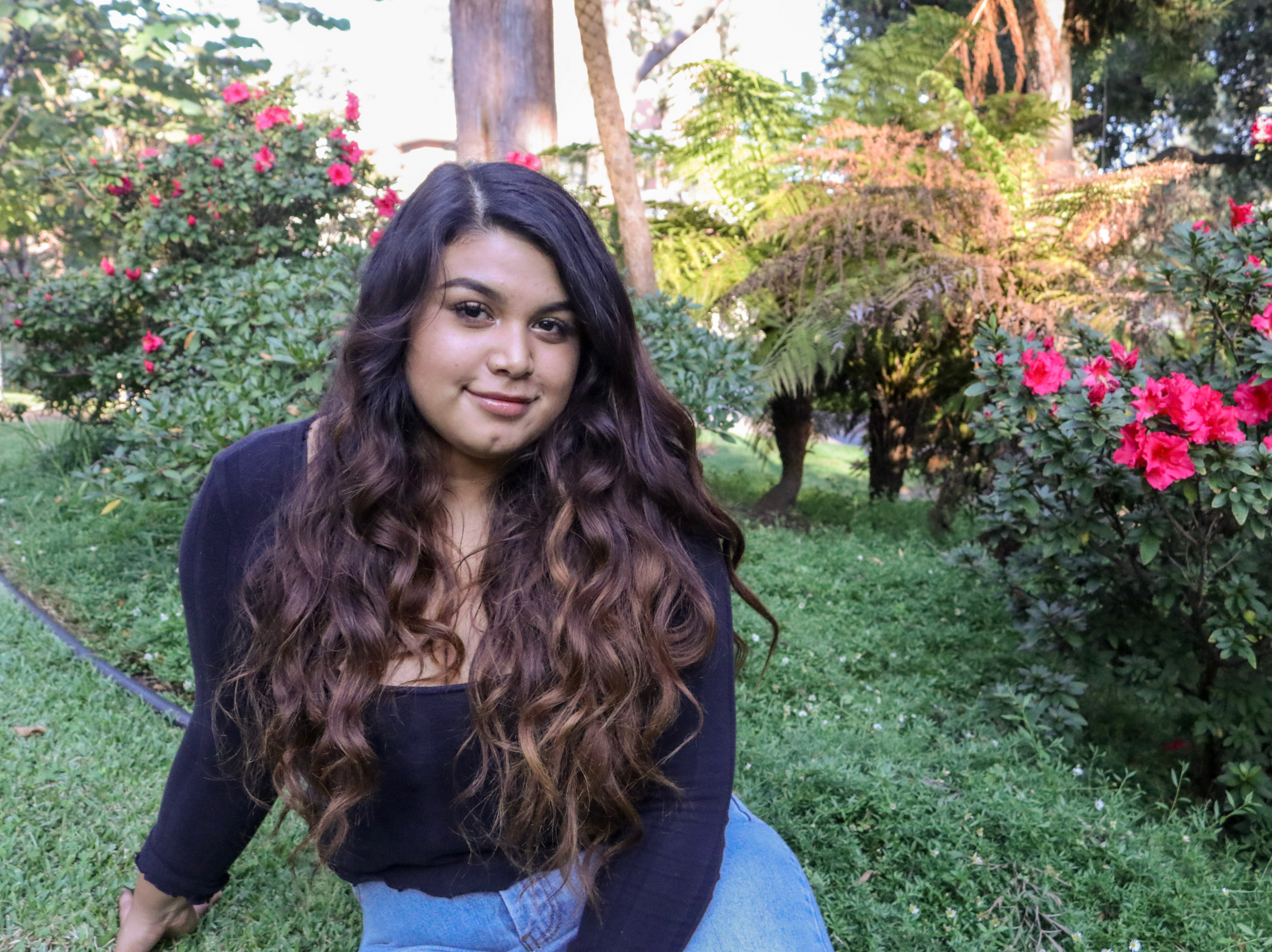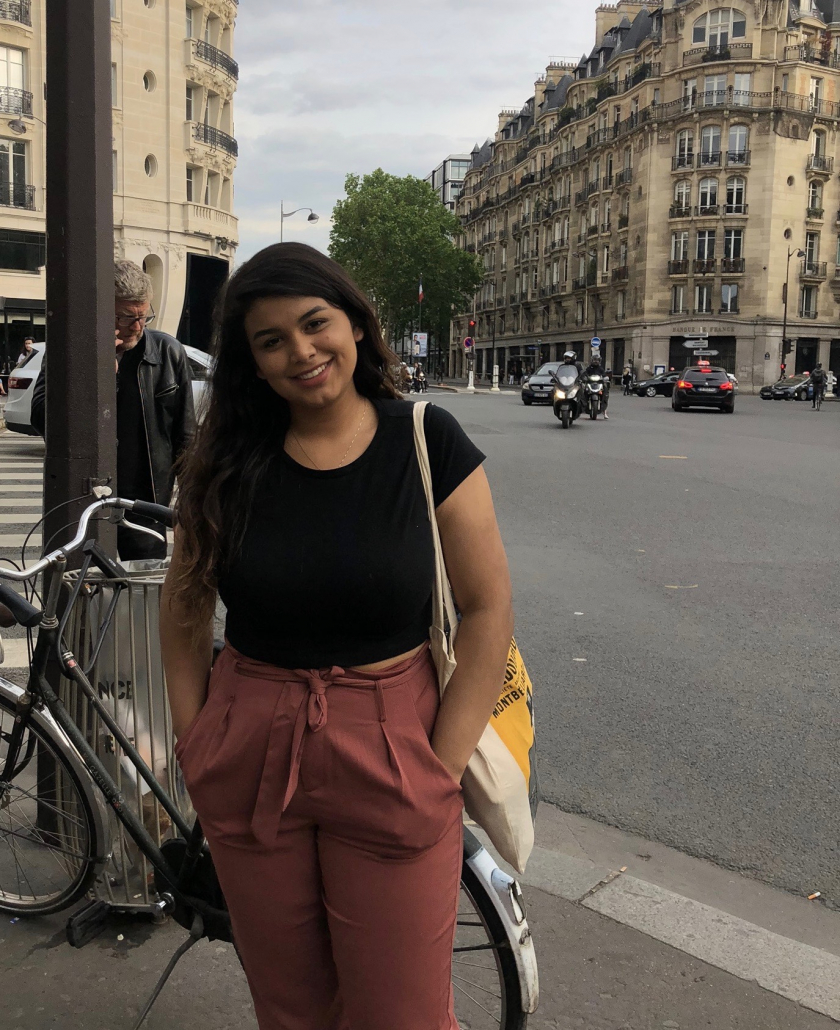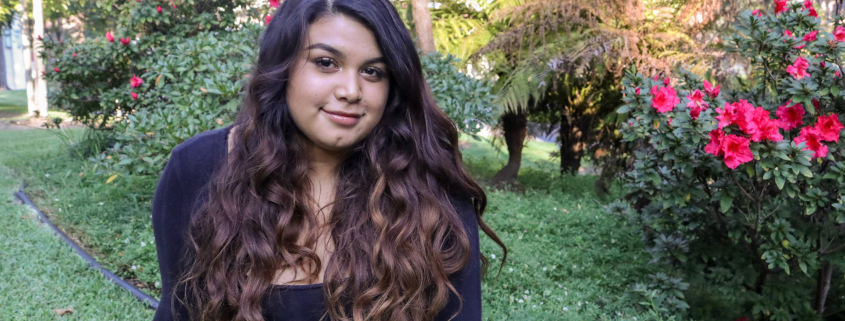Redefining community: Senior expands involvement in LA through programming, research

As a student from intersectional backgrounds, Mary Fernandez doesn’t feel as though she fits the image of an average USC student. While this may be intimidating for some, Fernandez draws inspiration from her background through her passion for supporting underrepresented communities.
Fernandez, a senior majoring in sociology and American studies, had not always considered herself a leader until she began to work with the Latinx Student Assembly. During her sophomore year, she was appointed secretary and has since continued to serve on the executive board.
“There’s definitely an aspect of my confidence that has been impacted by LSA,” Fernandez said. “LSA gave me a platform. Having those affirmations through LSA has really allowed me to become not just confident, but I would say, a leader who can take risks and is not afraid to take these leaps of faith.”
As secretary, Fernandez also organized an event for LSA that discussed the experiences of incarcerated people and the impact of the prison system, bringing in professors, students and system-impacted individuals.
Fernandez wanted the panel to start a discussion on the impacts of incarceration and make a lasting impact on students and others who attended. Sullyari Bautista, a senior majoring in political science, had attended the panel in support of Fernandez.
“She had various guest speakers come and talk about the way that educational resources play a part in the prison system,” Bautista said. “So, for example, part of the segment was how thankful people are when they’re able to receive books and learn while in prison. During that event she also collected book donations to donate to a juvenile center and so that was a really eye-opening event that discussed the ways that we, we being the Latinx community, can work towards actively supporting people in prisons.”
Bautista and Fernandez first met on El Sol y La Luna Latinx residential floors in Fluor Tower where they were able to be in a strong cultural community together and support each other in the transition to college. Throughout their time at USC, Bautista has seen the dedication Fernandez puts into her work and describes her as “one of the hardest working people” she knows.
“From her research fellowship to studying abroad in France to the research she’s published, I can directly see how much time and energy she invests into her work,” Bautista said. “I have never been in LSA myself, but I’ve gone to like the meetings that she’s held and it’s always been kind of a full-circle moment. So you see how much hard work she puts into these things, and then you go to these events and see them come together.”
Fernandez’s passion and responsibilities have grown from her secretary position to her current role as assistant director of LSA. She wants to use her position to pay it forward to newer members by giving them the same type of affirmations that past LSA directors gave her as a sophomore.
“[I want to show other e-board members] what good programming looks like because I think programming is overlooked,” Fernandez said. “If you’re trying to be intentional in your impact and intentional on how you deliver that impact like what methods you’re using, that’s where it becomes complicated. And I guess now my role now as assistant director is not to teach but to contribute and discuss these things with our e-board.”
Another LSA value Fernandez emphasizes is to extend the meaning of community. By doing so, Fernandez hopes to expand LSA’s work past the USC community and into the general South Central community as well.
This semester, LSA started a political education series, created by director of advocacy Rosa Noriega, where students received a copy of professor Angela Davis’ “Are Prisons Obsolete?” from a Black-owned, woman-owned bookstore called the Reparations Club. While most Undergraudate Student Government assemblies traditionally buy books from Amazon or Office Depot, Fernandez emphasized the importance of “being very deliberate in every step of the way” in supporting the community.
Outside of LSA, Fernandez also founded a cultural community in Kappa Delta Chi Sorority, a Latina-founded sorority dedicated to serving local university communities through volunteer service. The sorority has become a “home away from home” for Fernandez by giving her sisters like Cherise Cayetano, a senior majoring in law, history and culture.
“[Fernandez] likes to make sure everyone is taken care for while upholding our values as well, and it’s very admiring to watch her work in this space,” Cayetano said. “Mary [Fernandez] is honestly one of my best friends, I know I can go to her for any and everything. And you can tell that [her kindness] is so genuine that she truly does care for people.”
During Spring 2020, Cayetano and Fernandez both served on the special projects team for KDChi. After social distancing regulations were put in place due to the coronavirus pandemic, the team had to get creative with planning events while working remotely.
“Mary came up with the idea to do online programming for the entire week and it was really beautiful,” Cayetano said. “Mary literally had a vision and she was like ‘OK, these are the circumstances, we’re going to change it, we’re going to fix it and this is what we’re going to do.’”
KDChi has also given Fernandez the opportunity to work with communities that she values helping, such as C-Youth and C-Hope, a nonprofit organization that provides professional opportunities for previously incarcerated youth or those who come from foster care systems.

Fernandez has also worked closely with the L.A. community through the Mellon Mays Fellowship, an initiative to increase diversity in higher learning by encouraging students in underrepresented groups to pursue doctoral degrees. She has continued to research marginalized communities, such as incarcerated peoples, and makes a point to do so in an ethical way.
“In the past, I’ve looked at how women fit within the discussions around the carceral system. Now, I’m looking at how halfway houses function,” Fernandez said. “While it’s research that maybe is being done, I tend to come at it from an angle of how can I make sure that my methods are as ethical as possible. I don’t want to be an academic who is in contact with the community when it comes to an interview, but then after that they disappear.”
Through Mellon Mays, Fernandez worked with the Boyle Heights Museum, a research project that celebrates the multicultural history of the Boyle Heights neighborhood. The project has allowed her to become more deeply involved within the L.A. community as she interacts with businesses that she wouldn’t know about otherwise.
“[Boyle Heights Museum is] allowing me to know the history of L.A. and the history of L.A. as it pertains to historically marginalized communities which are really important to me, immigrant communities which are really important to me as well,” Fernandez said. “Immediate goals we have [are] to expand the vendor list that USC uses to more stores from Boyle Heights, more businesses.”
Fernandez hopes to connect USC more with other surrounding L.A. communities as a way to address modern day problems in respect to racial dynamics and capitalism. While learning about the Boyle Heights community, Fernandez also draws connections to her own community in Northeast Denver that has been heavily gentrified as well.
“What is happening in Boyle Heights is not exactly what is happening in Denver, but having these things happen before my eyes and seeing similarities and differences [has been] helping [me] find my perspective on the world,” Fernandez said.
Overall, Fernandez’s time and work, both within the USC and South L.A. communities, speak to her passion for supporting underrepresented populations and improving the areas that she is a part of.
“I feel like historically, USC, when they discuss community, they discuss community in terms of the student body, USC students and USC traditional students for that matter,” Fernandez said. “When USC talks about the student community, I don’t think they recognize that every student is different. We have transfer students, like I said, we have first-generation, low-income students. So, [my goal is] not only expanding what community means in terms of USC, but community in terms of the South L.A. community.”

